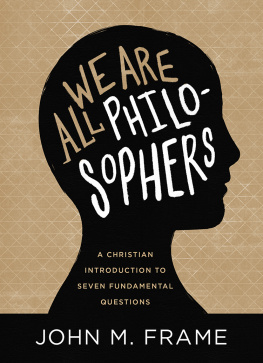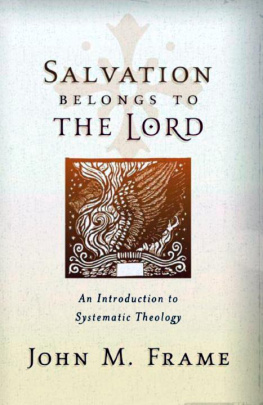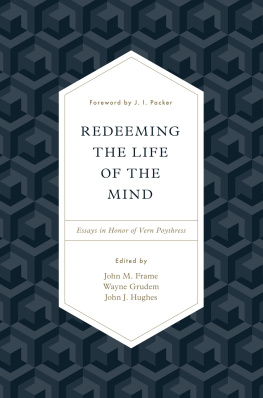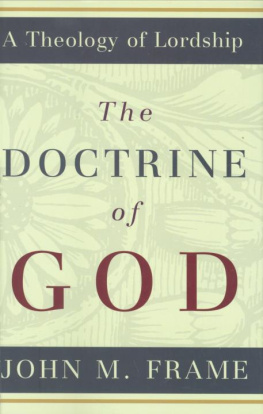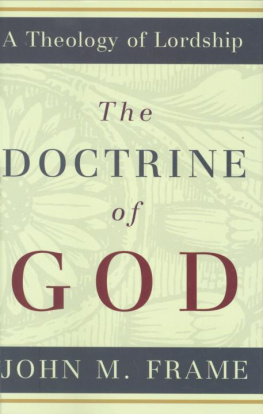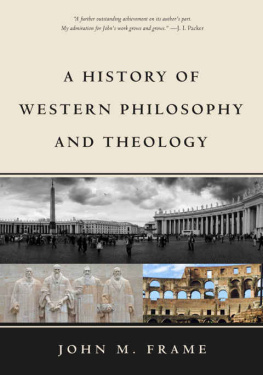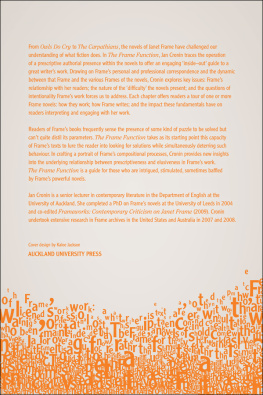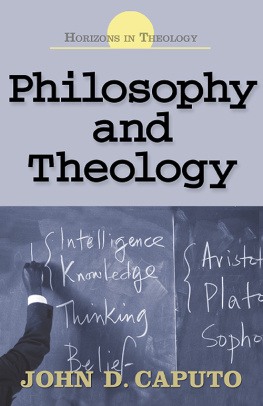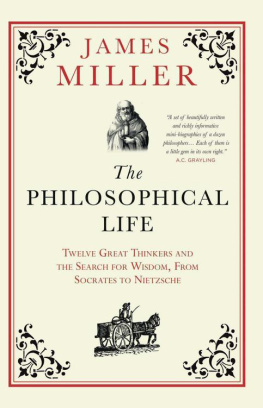WE ARE ALL PHILOSOPHERS
A CHRISTIAN
INTRODUCTION
TO SEVEN
FUNDAMENTAL
QUESTIONS
JOHN M. FRAME


We Are All Philosophers: A Christian Introduction to Seven Fundamental Questions
Copyright 2019 John M. Frame
Lexham Press, 1313 Commercial St., Bellingham, WA 98225
LexhamPress.com
All rights reserved. You may use brief quotations from this resource in presentations, articles, and books. For all other uses, please write Lexham Press for permission. Email us at .
Unless otherwise noted, Scripture quotations are from ESVBible (The Holy Bible, English Standard Version), copyright 2001 by Crossway Bibles, a publishing ministry of Good News Publishers. Used by permission. All rights reserved.
Print ISBN 9781683593102
Digital ISBN 9781683593119
Lexham Editorial: Mark Ward, Danielle Thevenaz
Cover Design: Joshua Hunt
To Colin
CONTENTS
After I wrote History of Western Philosophy and Theology, it occurred to me that perhaps I could write another book on philosophy that would be a bit less burdensome to the average reader. That book would be organized topically, rather than historically, and it would be a lot shorter and simpler. It would be more suitable for beginning philosophy students (college and seminary level, even some high school), and it would help them to see more clearly the practicality of the questions philosophers ask. Really, what we call philosophical questions are questions that we all ask, in one way or another. This book would help readers from all backgrounds to think through those questions with some clarity and depth.
In previous booksBut I think the books argument will show that repressing the truth about God leads to intellectual chaos.
So my desired audience in this book is everybody. Philosophical questions are questions that we all ask, and hence the title: we are all philosophers.
I am dedicating the book to a brilliant young man named Colin, who from childhood has asked philosophical questions. When his homeschooling family moved to Orlando, Colins father told him that he could meet a professor at Reformed Theological Seminary named Dr. Frame who could address his questions. The first question Colin asked me was, What is the basic composition of the universe? I tried to answer him, but badly fumbled the ball. In this book, the first chapter attempts a better answer to his question, though probably not one that he could have understood as a child. The other chapters attempt answers to questions Colin might have asked me if I had handled his first question more helpfully.
AJCB | Apologetics: A Justification of Christian Belief |
CVT | Cornelius Van Til: An Analysis of His Thought |
DCL | The Doctrine of the Christian Life |
DG | The Doctrine of God |
DKG | The Doctrine of the Knowledge of God |
DWG | The Doctrine of the Word of God |
HWPT | History of Western Philosophy and Theology |
NCG | Natures Case for God |
NOG | No Other God |
NT | New Testament |
OT | Old Testament |
ST | Systematic Theology |
TTD | Theology in Three Dimensions |
TOML | Theology of My Life |
WCF | Westminster Confession of Faith |
WLC | Westminster Larger Catechism |
WSC | Westminster Shorter Catechism |
WTJ | Westminster Theological Journal |
One of the first things we want to know about our world is its ingredients. We are curious about what goes into a chocolate cake, what materials are used to build our houses, what chips animate our smartphones. At one level, we answer these questions by personal experience, and we expand that experience by asking questions of other people and consulting other sources. When we ask the question more technicallyHow many milligrams of sodium are in this cookie?we turn to scientists for more expertise. Their perspective takes us to further dimensions of reality: everything is made of the elements of the periodic table, and those in turn are collections of subatomic particles of various kinds. A recent theory says that everything is ultimately made of vibrating strings. But in my unscientific way, I ask what the strings are made of, a question that Ive never seen an answer to.
As we ask the question more and more abstractly, at some point it becomes philosophical. Many of the questions we today consider scientific, such as those about astronomy and biology, were once considered philosophical: the philosopher Aristotle did not consider it beyond his proper arena to write books about the heavenly bodies and the parts of animals. But today, the term philosophy is reserved for the most abstract questions there are. Although the range of the term philosophy today is different from its use in the ancient world, questions of a highly abstract level have been with us since the beginning of the discipline.
THALES METAPHYSICAL WATER
The first Greek philosopher, Thales, is famous for saying all is water. The Greeks, who did not have our modern periodic table, acknowledged four elements out of which they thought everything was made: earth, air, fire, and water. That simplified somewhat the question of what the world is made of: there were only four possibilities. We dont know the reasons for Thales choice, but we can imagine him arguing with his colleagues and students that there is a huge amount of water in the oceans, lakes, and rivers, and that it even comes down from the sky. Thales probably didnt know how large was the percentage of water in the human body, but he may have made an observation about that, and about how difficult it is for us to survive without water.
But another philosopher, Anaximenes, thought that all was made of air; and he may well have replied to Thales that we can survive without water longer than we can survive without air. And look at the huge amount of air in the expanse around us.
But someone might have asked each of these men, How do you know that everything conforms to your thesis? Thales didnt have any way of judging how much water there was on the moon, planets, or stars. (We still debate that question.) And even if we could show that the earth and the heavenly bodies are all made of water, how can we be sure that that is the end of our quest? How can we be sure that water is truly an element, that it is not in turn made up of other ingredients?
Anaximander, another Greek philosopher of roughly the same generation, was more modest than Thales (its all water) and Anaximenes (its all air). He argued that we really dont know what the whole universe is made of. He thought it best to say that the basic ingredient was apeiron the indefinite. We dont know what it is, but everything else somehow comes out of it.

